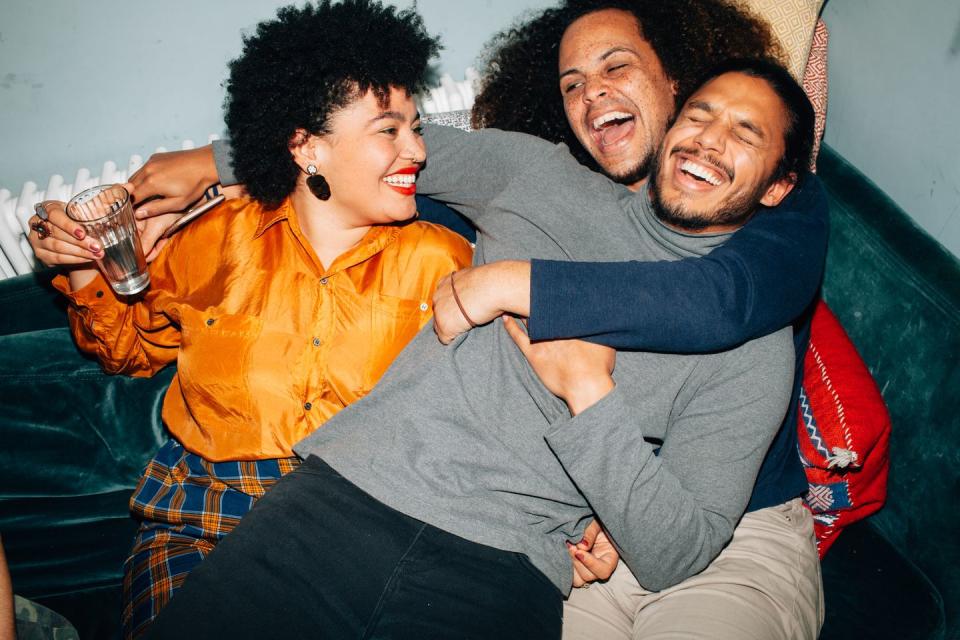What 'Polycule' Means in the World of Polyamory

SALLIE, 31, lives with her girlfriend, but she also has a boyfriend she spends just as much time with. The nonprofit worker occasionally has other partners on the side as well, as does her girlfriend. She, her girlfriend, and her boyfriend consider themselves to be part of a polycule, a linked group of polyamorous people.
“Polycule” is a play on the word “molecule,” and just as a molecule is made of a bunch of individual atoms that come together to form something totally new, a polycule consists of individual people who join to create a family of sorts.
What is a polycule?
“A polycule is three or more people who are connected romantically and/or sexually,” says Ashera DeRosa, a licensed marriage and family therapist who works with polyamorous people. People in a polycule may all be dating one another, or some members of a polycule may only date one person within it, like Sallie’s boyfriend and girlfriend.
Polyamory is an openness to having more than one romantic partner at a time, and a 2021 study published in Frontiers in Psychology found that more than 10% of Americans have practiced it. Basically any group of polyamorous people who are romantically and/or sexually linked could be considered a polycule, DeRosa says, although solo poly people (those who have multiple casual relationships but no super-serious ones) may be less likely to identify as part of a polycule. And, of course, it’s up to each individual and group how they identify.
What do polycules look like?
Polycules can be structured in a variety of ways. Some members of polycules will have a primary partner, which may be a live-in partner, a spouse, or someone they spend most of their time with, DeRosa explains. Other polycules may be less hierarchical, where all people are equally intertwined with one another and may even all live together.
Some members of a polycule may also be involved with each other platonically. “Polycules may function like a family, where everyone gets together and enjoys each other's company, but not necessarily on a romantic level,” explains Rhiannon John, a sexologist at BedBible. “But other polycules may have less to do with each other, only meeting on certain occasions, like the birthday of a common partner.”
The size of the group also varies from polycule to polycule. “A polycule can be small, such as a triad, where persons A, B, and C are in a relationship with each other,” says psychologist Traci S. Williams. “It can also be large, where multiple people are connected by their relationships or their partners’ relationships. For instance, persons A and B are married, while B, C, and D are in a relationship—and at the same time, C and D are also married, and their spouses have partners of their own.”
The one thing all polycules have in common, though, is that they sign on to the arrangement and respect one another’s boundaries. “A key aspect to practicing nonmonogamy is that all participants are aware of the relationships formed, and open discussion occurs to ensure everyone agrees to the terms of the relationships,” says Williams.

How do rules and boundaries work within polycules?
As with couples, polycules can be “closed” or "open." "Closed" means that people within the polycule don’t have romantic or sexual relationships outside it, while “open” means that they do.
“In an open polycule, members will often have boundaries regarding safer sex practices and a knowledge of who is fluid bound with whom,” DeRosa says.
Some people in polycules also have limits on what they do with certain partners. Jon Simons, a 40-year-old life and mindset coach in New York, lives with his wife and her boyfriend, but only he and his wife share a bed. In addition, she prefers that he does not tell her about his sex life with other people, though he tells her about other aspects of his relationships. He and all his partners share when they have a new partner, and “barriers must be used during sex unless discussed heavily,” he says.
Polyamory educator Leanne Yau, who lives in the U.K. with a nesting partner and also has a boyfriend and a more casual partner, says that while her polycule is open, everyone’s expected to keep commitments regarding how often they see their partners. “My boyfriend and I agreed to meet twice a week, and obviously, he can do whatever he wants with the rest of his time,” she explains.
How do I have a healthy polycule?
“When forming a polycule, it's important to form some infrastructure for the members to check in with one another on a proactive basis,” DeRosa says. This may mean blocking out time each week for everyone to talk about how their relationships are working out and what their needs are.
Many of the discussions that Simons has to maintain healthy relationships with his partners, especially those he lives with, involve humdrum things like schedules, chores, and finances. “Not having these conversations can build up resentment,” he says.
Yau shares her Google Calendar with all three of her partners so that they can coordinate schedules. “If there's trouble going on with one of my partners, then I tell my other partners so they understand if my emotional state’s a little bit different,” she adds.
“It's also important to revisit what the boundaries are with one another, especially sexual boundaries, in order to prioritize everyone's health and safety,” DeRosa says. “It's important to know how everyone is protecting themselves from STIs and unwanted pregnancies.”
Why do people form polycules?
While not for everyone, polycules work well for many people. “If a person encounters one unhealthy polycule, it doesn't mean that all polycules are inherently unhealthy,” DeRosa says. “There are many out there with happy, loved, and well-supported members.”
For some people, polycules provide a community that allows them to connect with the partners of someone they already know and love. “I like that everyone gets along, so then, I can spend time with multiple partners at once,” says Yau. “My partners can bond over their mutual appreciation of me.”
For Sallie, being in a polycule means more love and support, as well as sexual variety. “I can experience quite poor mental health, and having more people to support me helps enormously,” she says. “I don’t feel like I’m such a burden, and my partners can feel less isolated.”
Simons also enjoys having a support network of different people who meet different needs. “If either my wife’s boyfriend or I are under the weather, we’ll always help each other out by getting meds or making soup,” he says. “Any time either of us makes a quick run to a convenience store, we always ask the other if they need anything. Multiple times, I’ve had one partner find something that was a perfect gift for another and happily bought it for them. I’m a big proponent of chosen family, and polyamory is definitely one of the ways I achieve that.”
You Might Also Like

